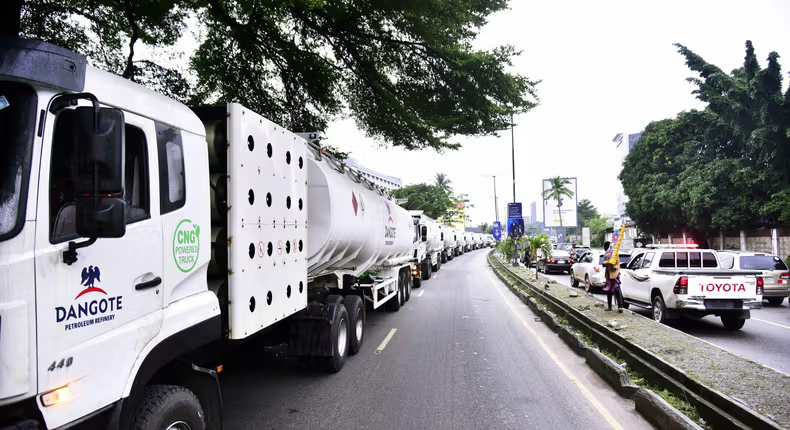Dangote’s CNG 450 Truck Rollout Faces Shipping Delays, Raises Hopes and Fears in Nigeria’s Fuel Supply Chain

The much-heralded rollout of 4,000 compressed natural gas (CNG) trucks at the Dangote Petroleum Refinery has been slowed by global shipping bottlenecks, highlighting both the promise and the pressures surrounding Nigeria’s energy future.
According to a senior official at the Dangote Group, only 450 trucks have arrived out of the planned 4,000, far below the company’s August target. The delay, caused by a shortage of ships leaving China, has forced the refinery to scale down its immediate supply chain ambitions. “Two hundred trucks came in the first vessel, 250 in the next. Another 150 are due next week,” the official explained, requesting anonymity.
Beyond corporate timelines, this is a project with human stakes that the plan has profound social and humanitarian implications. At full capacity, the fleet, valued at about ₦720 billion, is expected to overhaul the way petroleum products are delivered across Nigeria. But the shift has raised anxieties among transport workers and fuel marketers, who fear being sidelined as Dangote introduces its own logistics system.
In response, the company recently held talks with the National Association of Road Transport Owners (NARTO) and the Natural Oil and Gas Suppliers Association of Nigeria (NOGASA). The refinery pledged to integrate existing drivers and marketers into the new system, a gesture aimed at averting widespread job losses in a country already grappling with high unemployment.
For over thousands of families who depend on fuel distribution work for survival, the reassurance is more than technical, it is existential. “This is about people’s bread and butter. Every tanker driver supports a household, sometimes an extended family,” one NARTO member said after the meeting.
As a cost-saving and greener transition method, the CNG-powered trucks are designed to cut fuel distribution costs by 40% compared to diesel vehicles, potentially saving Nigeria about ₦1.7 trillion annually. For a nation where high logistics costs inflate the price of basic goods, the impact could ease household burdens while making the energy sector more resilient.
Environmentally, the move represents one of the most significant steps yet in aligning Nigeria’s oil-dominated economy with global clean energy trends. By reducing dependence on diesel tankers, the fleet promises to cut harmful emissions and set a precedent for greener industrial transport in Africa.
Nonetheless, in balancing progress with protection, the success of this transition will not be judged by cost savings alone. It will depend on whether the new system can balance efficiency with inclusivity, ensuring that innovation does not come at the expense of jobs or widen inequality.
The Dangote refinery, which already operates at about 85% of its 650,000 barrels-per-day capacity, stands at the heart of Nigeria’s energy supply chain. Its choices will ripple outward: into city markets where fuel scarcity dictates daily prices, into rural towns where livelihoods hinge on stable transport networks, and into households where energy costs remain a constant worry.
For now, the sight of the first CNG trucks rolling out of Apapa Port is both a symbol of progress and a reminder of the delicate human equation at the center of Nigeria’s economic transformation.






